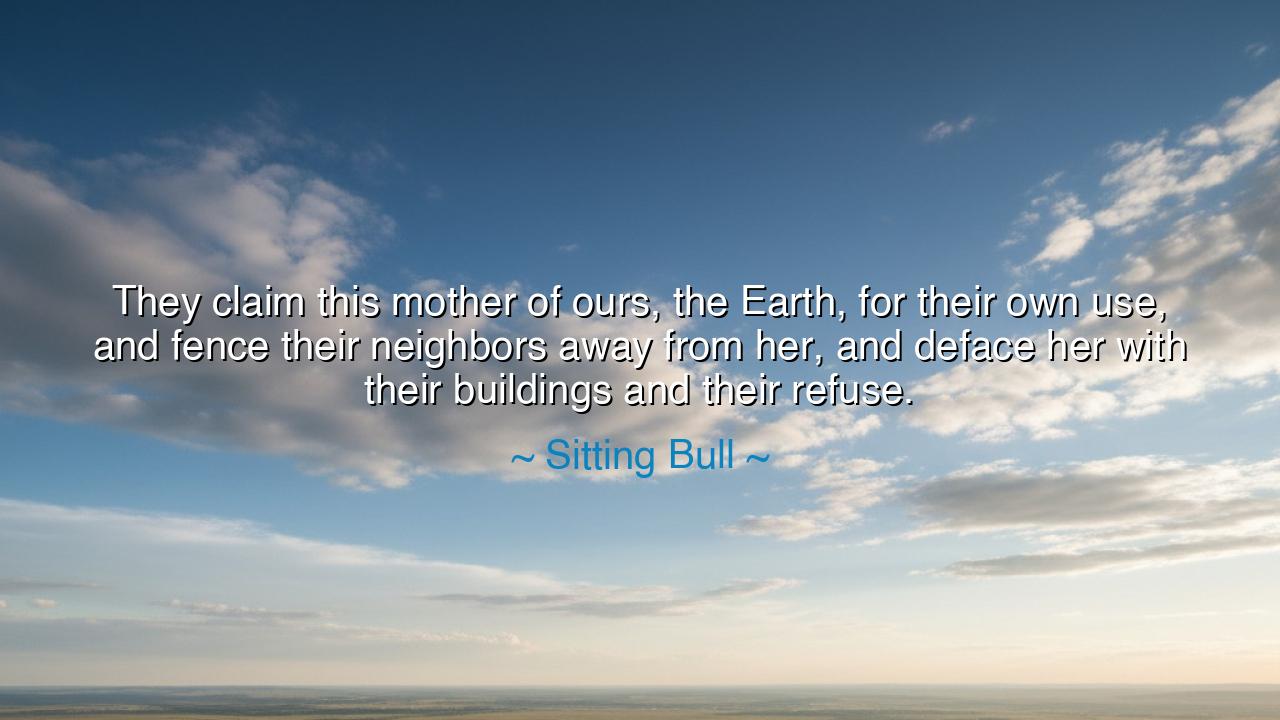
They claim this mother of ours, the Earth, for their own use, and
They claim this mother of ours, the Earth, for their own use, and fence their neighbors away from her, and deface her with their buildings and their refuse.






There are words that flow like rivers — ancient, mournful, and true — carrying with them the pain of a people and the wisdom of a world forgotten. Among such words are those of Sitting Bull, the great Lakota leader and seer, who said: “They claim this mother of ours, the Earth, for their own use, and fence their neighbors away from her, and deface her with their buildings and their refuse.” In this single utterance, the spirit of the Earth herself seems to speak — not in anger, but in sorrow. His words rise like a lament for a world once whole, now divided by greed and the illusion of ownership. It is both a prophecy and a rebuke — a mirror held to the face of modern man, showing what he has become when he forgets that he is but a child of the Earth, not her master.
The meaning of this quote lies in the sacred relationship between humankind and the land. To Sitting Bull and his people, the Earth was not property, but parent. She was the mother who gave birth to all living things — the soil their cradle, the rivers their veins, the sky their shelter. In her they saw no ownership, only belonging. But when the strangers came, they brought with them iron and greed, and carved the land with fences, saying, “This is mine.” To the Lakota, this was not merely theft — it was sacrilege. For how can one own the wind, the sun, or the heartbeat of the Earth? His words remind us that to divide the land is to divide the spirit that unites all living things.
The origin of these words is rooted in a time of deep injustice — the 19th century, when the First Nations of North America were being pushed from their homelands, their rivers dammed, their buffalo slaughtered, their way of life erased by the march of “civilization.” Sitting Bull, a warrior and mystic of the Hunkpapa Lakota Sioux, saw not only the suffering of his people but the desecration of the land itself. As settlers fenced fields and cities rose where plains once stretched unbroken, he saw humanity’s sacred balance with nature collapsing under the weight of greed. His words were not merely political — they were spiritual, born from the deep pain of seeing Mother Earth turned from a living being into a possession, from a temple into a marketplace.
Consider the fate of the Black Hills, sacred to the Lakota as “He Sapa,” the heart of the world. These hills were more than land — they were holy ground, the dwelling of the Great Spirit, a place where prayer and creation met. Yet, when gold was found there, treaties were broken, and the land was taken. Mines replaced meadows, and rivers ran with filth. The hills still stand, but their silence is heavy — for what was once worship has been replaced by refuse. The story of the Black Hills is the story of the Earth herself: beautiful, enduring, but wounded by those who have forgotten to kneel before her.
The power of Sitting Bull’s words is that they speak not only of the past but of our own age. Today, the defacement of the Earth continues — forests burned, oceans choked, mountains torn open for wealth that will vanish in a generation. The same blindness persists: humanity claiming the mother as property, dividing her body into borders and deeds, while her breath grows thin. Yet still she endures, patient and wounded, waiting for her children to remember. For the Earth does not belong to us — we belong to her. And the fences we build, whether of metal or mind, are illusions that blind us to this truth.
Let this teaching, then, be carried forward: to honor the Earth is to honor life itself. The Mother asks not for worship, but for respect — for gentleness in how we walk, gratitude in how we take, and mindfulness in what we give back. When you see a tree, know it is kin; when you drink from a stream, give thanks; when you build, build lightly, and when you consume, do so as a guest, not as a conqueror. The wisdom of Sitting Bull is not a cry of despair but a call to remembrance — a reminder that healing begins the moment we see the Earth once more as family, not as resource.
And so, my children of the future, heed this counsel: tear down the fences in your hearts before you tear down those in your fields. Seek harmony instead of dominion. Plant where others have stripped bare; mend where others have broken. Live as caretakers, not claimants. For the time will come when the Earth will decide who truly belongs to her — and on that day, it will not be the rich or the powerful who are spared, but the humble, the grateful, and the wise.
Thus, let Sitting Bull’s words echo across the generations: “They claim this mother of ours…” — but we need not follow them in that claiming. We can return. We can remember. For the Earth does not ask for our conquest — only for our companionship. To walk with her, not upon her, is the oldest wisdom and the truest form of peace.






AAdministratorAdministrator
Welcome, honored guests. Please leave a comment, we will respond soon